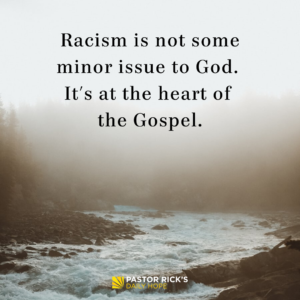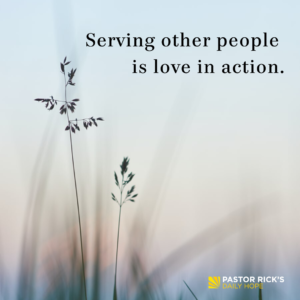Rick Warren's Blog, page 370
June 16, 2020
Grace Is Needed Now More Than Ever

To make it through the extraordinary crisis of a pandemic and social unrest, you need to treat yourself and other people the way God treats you: with grace, mercy, and forgiveness.
Grace means that God always gives you what you need, not what you deserve. If you got what you deserved, you wouldn’t even be here. “God gives us even more grace, as the Scripture says, ‘God is against the proud, but he gives grace to the humble’” (James 4:6 NCV).
God opposes the prideful and arrogant because they think they can do it all by themselves, apart from God. They don’t think they need God or his grace. They approach life—even life in turmoil—with the mindset, “If it’s to be, it’s up to me.”
But when you’re humble and admit that you can’t make it through this situation on your own, God opens the floodgates of heaven. He pours out his grace. And he expects those who have been shown amazing grace to then show that grace to others.
Everybody’s having a tough time right now. To maintain your emotional health, you need to cut yourself some slack and do the same for others. Everybody’s feeling the stress, particularly the millions of people who are out of work and concerned about the future—maybe even about how they will make it to the next day. Be kind. Be gentle. Even the hardest people to love are fighting some kind of battle right now and need your grace.
This will often take a lot of humility. With tensions high, it’s easier right now to return wrong for wrong, give a sharp answer, withhold the benefit of the doubt, and speak before listening.
Your neighbor needs your grace. Your children need your grace. The person you disagree with politically needs your grace. The world is on the defense, and there is nothing that will disarm people more than being given unexpected grace.
God has given you great grace. Go and extend that grace to others so they get a glimpse of what Jesus has done for them.
The post Grace Is Needed Now More Than Ever appeared first on Pastor Rick's Daily Hope.
June 15, 2020
How to Overcome the Sin of Prejudice

Prejudice is a serious sin. It’s not some infraction that God winks at. To call it anything but sin would be against what the Bible teaches: “You will be doing the right thing if you obey the law of the Kingdom, which is found in the scripture, ‘Love your neighbor as you love yourself.’ But if you treat people according to their outward appearance, you are guilty of sin, and the Law condemns you as a lawbreaker” (James 2:8-9 GNB).
That’s pretty clear. But as I’ve traveled around the world, I’ve come to the conclusion that prejudice, particularly racial prejudice, may be the world’s most prevalent sin. No matter where you go in the world, somebody doesn’t like somebody else. You find it everywhere. And though it plays out in countless ways in society, many people would deny that they have any prejudice toward others.
To move toward racial reconciliation, we have to admit and confess our prejudices. Why? Because racism is a sin problem, not a skin problem. This is not some minor issue to God. It’s at the heart of the Gospel.
Like many people, you may have been raised to mistrust or stay away from what’s different. You probably feel most comfortable with people like you. That’s human nature.
But we must still learn to see people the way God does. How do you learn to see everybody who comes into your life the way God does? “The LORD does not look at the things people look at. People look at the outward appearance, but the LORD looks at the heart” (1 Samuel 16:7 NIV). You’ve got to look at the heart.
If you want to know someone’s heart, then you’ve got to go past pleasantries and shallow conversations. You need to get to know them. You need to ask questions and be a good listener. You need to be empathetic and full of grace.
Start with your heart. Confess the sin of prejudice. Then, ask God for his help to see people as he sees them and to use you to help reconcile people to each other and, most importantly, to him.
The post How to Overcome the Sin of Prejudice appeared first on Pastor Rick's Daily Hope.
Si No Usas los Talentos que Dios te Dio, las Otras Personas Serán Defraudadas

“Dios, de su gran variedad de dones espirituales, les ha dado un don a cada uno de ustedes. Úsenlos bien para servirse los unos a los otros”. 1 Pedro 4:10 (NTV)
La Biblia dice en 1 Pedro 4:10, “Dios, de su gran variedad de dones espirituales, les ha dado un don a cada uno de ustedes. Úsenlos bien para servirse los unos a los otros” (NTV). Cuando usan sus habilidades para ayudarse los unos a los otros, Dios es glorificado.
Dios te creó para contribuir. Dios no te dio talentos y habilidades para tu beneficio personal. Son para el beneficio de otras personas, y los talentos de las otras personas son para tu beneficio.
Estoy muy agradecido por las personas que tienen talento en áreas donde yo no soy bueno. Por ejemplo, estoy agradecido por mis contadores. ¡Porque no soy bueno con la contabilidad! Estoy agradecido por la gente que sabe de impuestos.
Estoy agradecido por la gente con habilidades mecánicas. No podría arreglar un carburador si tuviera que hacerlo. ¡Ni siquiera sabría dónde está!
Todo el mundo tiene diferentes talentos.
Dios me ha dado algunos talentos. Uno de ellos es tomar la Palabra de Dios y hacerla clara para que otras personas la puedan comprender. Cuando uso esa habilidad, tú eres bendecido. Mi talento es para ti. Es para ayudarte.
Pero este es el punto: Tú también tienes talentos. ¿Los estás utilizando para bendecir a otros? ¿Los estás usando para ayudar a otros?
Si no usas los talentos que Dios te dio, otras personas son defraudadas. La forma en que traes gloria a Dios es usando tus talentos. “Usa tus dones para servir los unos a los otros”. Dios es glorificado cuando usas tus habilidades para servir a otros.
Reflexiona sobre esto:
¿Qué dones te ha dado Dios?
¿Cómo utilizas los dones que Dios te ha dado para servir a otros? ¿De qué otras formas podría querer Dios que los uses para el beneficio de otros?
¿En qué forma necesitas aceptar la ayuda de alguien para que esa persona sea capaz de utilizar sus dones para traer gloria a Dios?
The post Si No Usas los Talentos que Dios te Dio, las Otras Personas Serán Defraudadas appeared first on Pastor Rick's Daily Hope.
June 14, 2020
Comparte tus Experiencias

“Anímense los unos a los otros, y ayúdense a fortalecer su vida cristiana”. 1 Tesalonicenses 5:11a (TLA)
La Biblia nos dice en 1 Tesalonicenses 5:11a “Anímense los unos a los otros, y ayúdense a fortalecer su vida cristiana” (TLA). Dios quiere que construyas, motives e inspires a otras personas. ¿Cómo puedes hacer esto? Puedes hacerlo de tres maneras: Puedes dar a las personas esperanza, puedes ayudar a las personas a superar sus miedos y puedes ayudar a las personas a derribar sus barreras.
Primero, puedes dar a las personas esperanza. Muéstrales que has pasado por las mismas cosas y asegúrales que ellos también podrán superarlo. Muéstrales a través de tu historia que si se puede lograr.
Cuando compartes tus experiencias con otras personas, les ayudas a quitar sus miedos. Es como subirse a una montaña rusa, cuando vas a uno de estos parques de diversiones y nunca te has subido a una de esas montañas rusas gigantes y tienes esta clase de pensamiento, “¿Será una decisión inteligente?” Entonces, la persona que está adelante se voltea y te dice, “Ésta es una extraordinaria atracción, ya me he subido cinco veces”. Entonces piensas, “Bien, voy a sobrevivir, él ya lo ha hecho cinco veces. Todo va a estar bien”. Escuchando a alguien que ya afrontó lo mismo, es una inspiración. Es una motivación.
¿Cuántos padres primerizos sienten mucho miedo, se sienten no preparados e inexpertos? ¡Todos! Ellos están tan agradecidos con alguien que viene y les dice: “Los bebes lloran. Esta bien, es normal”. Los miedos que ellos están experimentando no se ven tan desalentadores, cuando otros comparten sus experiencias y como las superaron. ¡Esto les da esperanza!
También puedes ayudar a las personas a derribar sus barreras cuando los motivas con tu propia experiencia. En 1954, Roger Bannister fue el primer hombre en correr una milla en cuatro minutos. Antes de que él lo hiciera, todo el mundo decía que era imposible — nadie podría correr tan rápido. Un año después Bannister rompió esa barrera, y otra docena de hombres también pasaron el record de los cuatro minutos. Repentinamente, las personas se dieron cuenta de que no era imposible y esto les dio esperanza que ellos también podían hacerlo.
Tienes experiencias en tu vida que podrían derribar barreras, inspirar y motivar a otras personas, pero solo sucederá si estás dispuesto a compartirlas con ellos. Esta es una de las maneras que puedes alentar a otros y darles esperanza.
Reflexiona sobre esto:
¿Qué significa esta frase para ti: “La manera más poderosa de decir algo es la manera más personal de decirlo”?
¿Qué dolor o experiencias difíciles de tu pasado, podrían ayudar a otros a aprender y darles esperanza?
¿Has estado orando a Dios para que te de oportunidades de compartir con otros?
The post Comparte tus Experiencias appeared first on Pastor Rick's Daily Hope.
The Racism Antidote: Love Like Jesus Does

Racism begins with a lack of love. You can’t love someone like Jesus does and harbor prejudice in your heart toward that person. It’s impossible. We must love everybody the way Jesus does.
Jesus gets very specific about this in John 15:12: “My command is this: Love each other as I have loved you” (NIV). How does Jesus love us? Unconditionally, freely, completely, and continually. So how should you love other people—even those of other races? Unconditionally, freely, completely, and continually.
Love doesn’t mean we approve of everything someone else does. Jesus doesn’t approve of everything we do, but he still loves us.
The Bible says, “As believers in our Lord Jesus . . . you must never treat people in different ways according to their outward appearance” (James 2:1 GNB). Although a person may look to be homeless, you should treat that person as you would a CEO.
Love is very practical. A couple that has been in my small group has seven kids, four biological and three by adoption from Rwanda. Knowing the three kids from Rwanda would likely have experienced racism, I asked them recently how they believe Christians should deal with race. They responded with very practical ways to love people of other races.
1. Don’t be colorblind. They like their color, so you don’t have to ignore it. Just don’t make decisions about them based upon their race.
2. Don’t tell people who’ve been treated unjustly that you understand. You don’t. Nobody knows the injustices others have faced. To say you do is simply being dismissive.
3. Remember that your history is not the same as their history. Someone born in inner-city Chicago and a person born on a ranch in Gallup, New Mexico, have different histories. And history matters.
4. Don’t ignore history or say, “Get over it.” Pain matters. These three kids with whom I was talking were orphaned because their parents were killed in a genocide. Your parents weren’t killed in a genocide. You can’t possibly understand their pain.
5. Fight all stereotypes. Everybody in the world feels stereotyped. But stereotypes are never true. Let’s commit to seeing each and every person as an individual, not someone stereotyped because of their skin color, creed, or nationality.
Together, when we love like Jesus does, we can eradicate racism.
Are you ready to start?
The post The Racism Antidote: Love Like Jesus Does appeared first on Pastor Rick's Daily Hope.
June 13, 2020
Be Color Blessed, Not Colorblind

Some people say, “When I look at people, I don’t see their race. I don’t see their color.” There’s a word for that: liar!
Nobody is colorblind when it comes to race. And God doesn’t want you to be colorblind. He wants you to be color blessed.
God loves color. Just take a look outside! Everything he makes is in color, like sunsets and flowers. Look at all the different people around the world. God loves color! The way he created you demonstrates this.
We need to learn to see all people the way God sees them.
The Bible says, “The Lord does not look at the things people look at. People look at the outward appearance, but the Lord looksat the heart” (1 Samuel 16:7 NIV).
Quite frankly, that’s a tall order for most of us. It’s not natural to look at the inside before the outside. We’re trained to make snap judgments based on outward appearance.
Some people you trust just by looking at them, others you don’t. Books are judged by their covers. Homes are judged by their curb appeal. People are judged by how they look, dress, and talk.
So ask God to help you start seeing people the way he sees them. Look at their heart, not their skin.
It’s one of the first steps toward overcoming prejudice in your life — and in the world around you.
The post Be Color Blessed, Not Colorblind appeared first on Pastor Rick's Daily Hope.
Dos Maneras de Examinar tus Experiencias

“Examínense para saber si su fe es genuina. Pruébense a sí mismos. Sin duda saben que Jesucristo está entre ustedes; de no ser así, ustedes han reprobado el examen de la fe genuina”. 2 Corintios 13:5 (NTV)
Una experiencia sin examinar carece de valor.
Hay personas que tienen 50 años de edad que no han vivido 50 años. Han vivido un solo año 50 veces. Están repitiendo los mismos errores, porque nunca se han detenido a revisar y analizar las lecciones. Nunca se detienen para preguntar: “¿Qué pasó el último año y qué puedo hacer diferente para vivir mejor mi vida?”.
La Biblia dice en 2 Corintios 13:5, “Examínense para saber si su fe es genuina. Pruébense a sí mismos. Sin duda saben que Jesucristo está entre ustedes; de no ser así, ustedes han reprobado el examen de la fe genuina” (NTV).
¿Qué significa esto? Significa que debes tomarte un tiempo para revisar las experiencias de tu vida, y que debes analizar y buscar dos cosas:
Busca beneficios. ¿Qué es lo que realmente disfrutas en tu vida? No te conformes con decir: “Realmente me gustaba ese trabajo”. Pregúntate: “¿Qué era exactamente lo que más me gustaba de ese trabajo?”. No te limites diciendo: “En realidad me gustaba esa clase”. Pregúntate: “¿Qué era lo que en realidad me gustaba de esa clase? ¿Por qué me agradaba tanto?”. De esta forma vas a ir descubriendo pequeñas pistas para saber por dónde deberías dirigirte en tu vida.
Busca patrones. Particularmente, debes buscar patrones de tus fracasos, porque cuando fallas, tiendes a hacerlo de la misma forma todas las veces. Entonces, miras y dices: “¿Dónde he fallado en el pasado? ¿Qué patrones sigo repitiendo?”. No buscas estos detalles para castigarte a ti mismo, sino porque quieres ser diferente. Quienes ignoran los errores de su pasado tienden a repetirlos. Este era un problema muy real para los israelitas. Su viaje a la Tierra Prometida debió haber tomado tan solo 4 semanas, y no 40 años. Pero ellos se rehusaron aprender de sus propias experiencias y de las pruebas de Dios. Cada prueba fallida significaba otra larga vuelta por el desierto.
La Biblia dice en Job 32:7, “La sabiduría viene con los años” (NTV). Este versículo representa una posibilidad, no una promesa. Conozco a mucha gente que es vieja y no muy acertada en sus resultados. La sabiduría no viene automáticamente con la edad. La madurez se produce cuando tú haces un análisis de tus experiencias cotidianas de la vida.
Reflexiona sobre esto:
¿De qué experiencias personales del año pasado puedes aprender algo?
¿De que forma el fracaso te ha hecho madurar espiritual, emocional y mentalmente?
¿Qué consideras evidencias de madurez y sabiduría en tu vida?
The post Dos Maneras de Examinar tus Experiencias appeared first on Pastor Rick's Daily Hope.
June 12, 2020
Atesora tus Experiencias pasadas — Buenas y Malas

“Recuerden hoy que fueron ustedes, y no sus hijos, los que vieron y experimentaron la disciplina del Señor su Dios”. Deuteronomio 11:2a (NVI)
Debes aceptar las experiencias de tu vida — las buenas, las malas, las vergonzosas, las correctas, las equivocadas, las felices, y las tristes; y dejar de huir de tu pasado, si quieres que Dios las use para bien en tu vida.
Gálatas 3:4 dice, “Han pasado por muchas experiencias, ¿será que las van a desperdiciar?” (PDT).
¡No huyas de tu pasado! A causa del dolor, muchas personas niegan su pasado, ignoran su pasado, menosprecian su pasado, se arrepienten de su pasado o tienen resentimientos de su pasado. Al revisar su pasado, inventan historias debido a que son más felices tratando con una mentira que con el dolor del pasado. Pero si estás en negación, Dios no puede usar tus experiencias para el bien.
Dios puede usar cada experiencia en tu vida para bien, pero debes dejar de huir de esas experiencias. Tienes que aceptarlas. Tal vez tus padres no fueron tan buenos, tal vez tu no fuiste a esa escuela famosa, tal vez no fuiste el capitán del equipo o la reina del baile de graduación ¿Y qué? Son tus experiencias. Aprópiate de ellas.
Deja de intentar sacar de tu mente las malas experiencias. Tienes que recordarlas. Deuteronomio 11:2a dice, “Recuerden hoy que fueron ustedes, y no sus hijos, los que vieron y experimentaron la disciplina del Señor su Dios” (NVI).
Ese versículo dice que lo importante es recordar las lecciones aprendidas. ¿Cómo haces eso? La mejor manera de recordar las lecciones y las experiencias de tu vida es escribir un diario. No estoy hablando de una agenda. Una agenda es una lista de lo que hiciste: “Hoy fui a la tienda y compré leche”. No necesariamente escribes diariamente en un diario. Pero cada vez que tienes una lección importante, lo escribes para que no lo olvides: “Eso fue doloroso. Aprendí de la forma difícil. No quiero olvidar eso”.
Para recordar lo que has aprendido sobre Dios, mantén un diario. Entonces después podrás revisarlo y recordarás lo que Dios te enseñó para que puedas ser animado en los tiempos difíciles de tu vida y conocer que Dios sigue trabajando para tu beneficio.
Reflexiona sobre esto:
¿Qué haces para recordar la fidelidad de Dios y las oraciones contestadas?
Si no “eres un escritor”, ¿cuáles son algunas formas en las que puedas llevar un registro de las lecciones de Dios en lugar de papel y lápiz?
The post Atesora tus Experiencias pasadas — Buenas y Malas appeared first on Pastor Rick's Daily Hope.
God Hates Prejudice, and We Should, Too

Our nation is desperate for healing on the topic of race. We’re in a mess, and the Church can’t be silent. The Body of Christ has to talk about it, even though it’s uncomfortable.
We can’t ignore racism because, quite simply, God hates it. If God hates racial prejudice, then we should, too.
Why does God hate racial prejudice?
Racial prejudice questions God’s creation.
God could have made us all the same. We could have all looked alike, but God didn’t do that. He loves variety!
Racial prejudice is a sign of ignorance.
When we demonstrate prejudice, we show the world we don’t know what we’re talking about. We’re revealing our foolishness.
The Bible says, “Anyone who hates a brother or sister is in the darkness and walks around in the darkness. They do not know where they are going, because the darkness has blinded them” (1 John 2:11 NIV).
The Bible says if I hate someone just because that person is different, I’m in the dark — and blind. That’s a pretty serious accusation from God.
Racial prejudice disobeys the Great Commandment.
Paul says, “The entire law is fulfilled in keeping this one command: ‘Love your neighbor as yourself.’ If you bite and devour each other, watch out or you will be destroyed by each other” (Galatians 5:14-15 NIV).
If you display a racist attitude, you’re disobeying the plain truth of this Scripture. We can’t make judgments about another person based on outward appearance and truly love him or her as a brother or sister.
Racial prejudice is a serious sin.
Prejudice makes God mad. The Bible says, “If you treat people according to their outward appearance, you are guilty of sin, and the Law condemns you as a lawbreaker” (James 2:9 TEV).
Racism is a problem of sin, not skin. One day we’ll give an account for that sin before God.
The important thing to remember as we search our hearts for prejudice and bigotry is that, “If we confess our sins, he is faithful and just and will forgive us our sins and purify us from all unrighteousness” (1 John 1:9 NIV). We will only eliminate prejudice as each one of our hearts is transformed by the love of God. He is willing and able to change us.
The post God Hates Prejudice, and We Should, Too appeared first on Pastor Rick's Daily Hope.
June 11, 2020
Even a Barbeque Can Build a Bridge of Love

God has given you unique talents, gifts, abilities, and skills. But those things weren’t given for your benefit. They were given to you for the benefit of others. And, despite the need to stay closer to home these days, there’s never been a better time to put those gifts to work as you obey God’s command to love your neighbor.
Meeting needs and serving other people is love in action. The Bible says in 1 John 3:17, “If anyone has the world’s goods and sees his brother in need, yet closes his heart against him, how does God’s love abide in him?” (ESV).
I’ve heard about a lot of innovative ways people have been serving their neighborhoods since the pandemic began. When you go to the grocery store, you can check with your neighbors, especially older ones, to see if they need anything. Offer to mow someone’s lawn or wash their car. Maybe someone has questions about their kids’ schooling, their taxes, or a car problem that you are uniquely gifted to answer.
Food always opens doors! Make a meal for someone or drop off donuts for a family.
Bring the newspaper to their door. Offer to pull weeds or help with an outdoor project. Share your number so people can text you with a need. I heard of one family that even posted a QR code on mailboxes to join a group for support during the pandemic. You can also invite people to watch your church service online and talk with them about it after.
Most importantly, there’s one way you can serve your neighbors that will meet their greatest need: Share with them about how much God loves them and how Jesus Christ died to save them.
You need to learn how to explain to your neighbors how they can become friends with Jesus. It’s not that hard, friends. You share with them that their past can be forgiven, that they can have a purpose for living, and that they can have a home in heaven. You build a bridge of love between your heart and theirs with a barbecue or a driveway conversation, and you let Jesus walk across.
The most important way you can love your neighbor is to introduce them to Jesus. Make the most of every opportunity to serve the people around you in love so they can learn about the greatest love they’ll ever know.
The post Even a Barbeque Can Build a Bridge of Love appeared first on Pastor Rick's Daily Hope.
Rick Warren's Blog
- Rick Warren's profile
- 2008 followers



